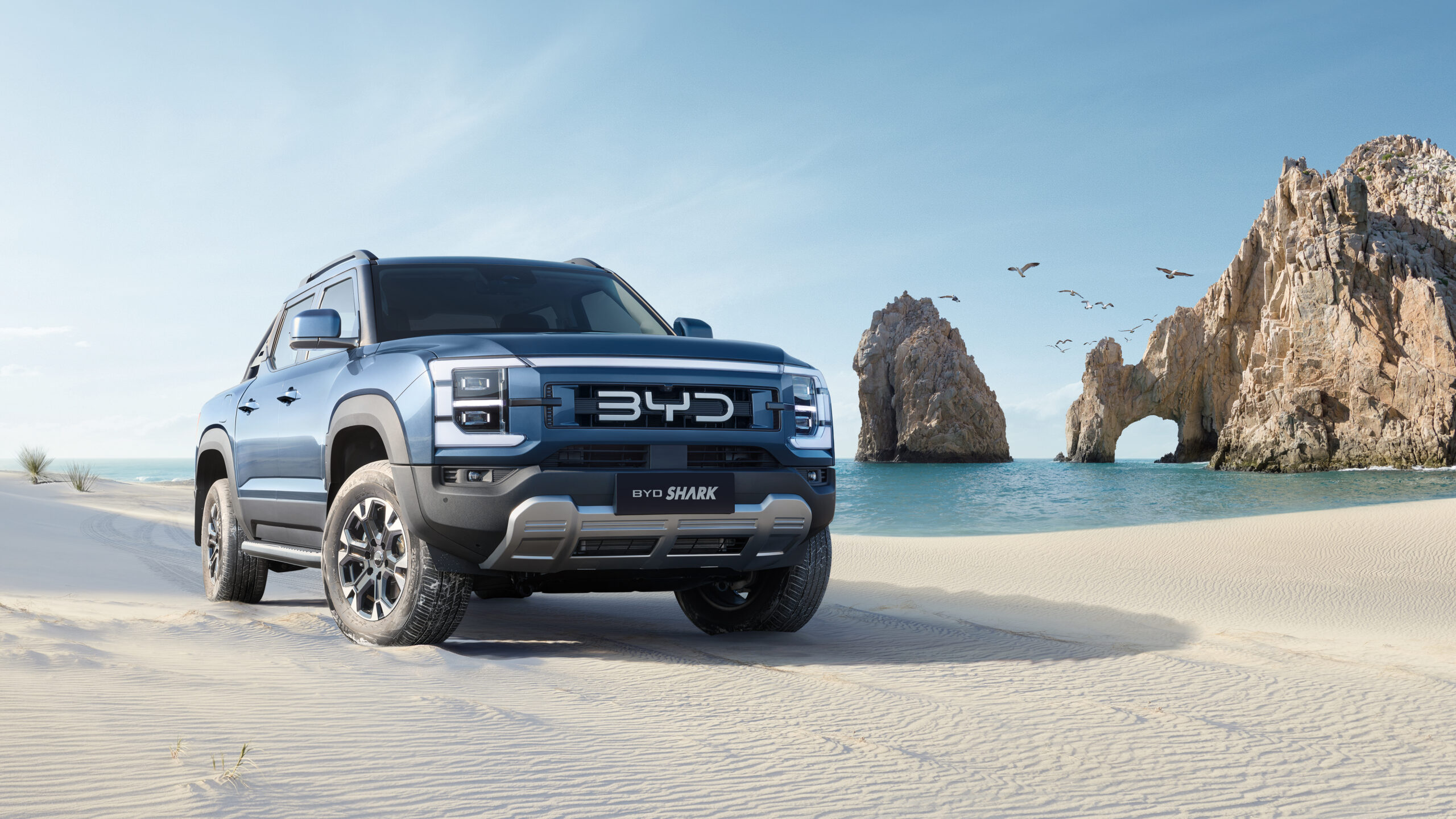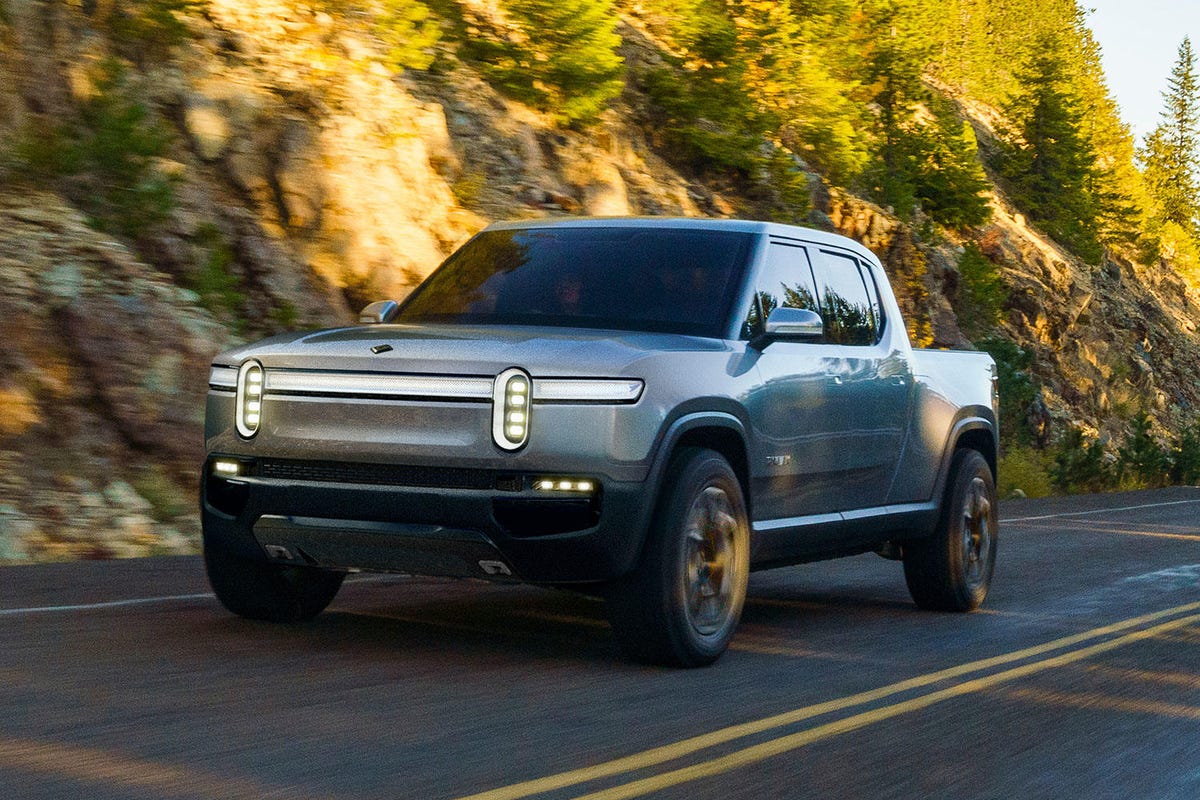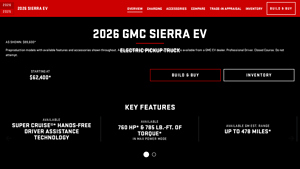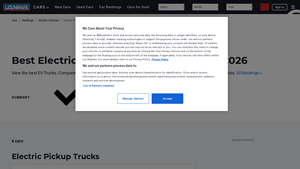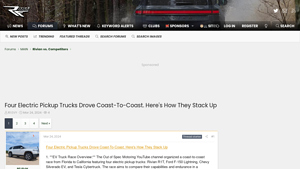Introduction: Navigating the Global Market for electric pickup truck
In the rapidly evolving landscape of sustainable transportation, navigating the global market for electric pickup trucks presents both opportunities and challenges for B2B buyers. As businesses seek to enhance their fleets while minimizing environmental impact, sourcing electric pickup trucks that meet specific operational needs becomes paramount. This comprehensive guide delves into the diverse types of electric pickup trucks available, their applications across various industries, and strategies for effective supplier vetting. By addressing key considerations such as cost, range, and technological capabilities, this resource empowers international buyers from regions like Africa, South America, the Middle East, and Europe—particularly Nigeria and Brazil—to make informed purchasing decisions.
The shift towards electric vehicles is not merely a trend; it signifies a substantial transformation in how businesses operate. This guide will help you understand the various models on the market, such as the Rivian R1T and Ford F-150 Lightning, which boast impressive ranges and innovative features tailored for different sectors. Furthermore, we will explore best practices for evaluating suppliers, ensuring that your procurement process is efficient and aligns with your company’s sustainability goals. Armed with this knowledge, B2B buyers can confidently navigate the complexities of the electric pickup truck market, positioning their businesses for success in an increasingly eco-conscious world.
Understanding electric pickup truck Types and Variations
| Type Name | Key Distinguishing Features | Primary B2B Applications | Brief Pros & Cons for Buyers |
|---|---|---|---|
| Full-Size Electric Pickup | Large cargo capacity, high towing capacity, advanced tech | Construction, logistics, heavy-duty operations | Pros: High performance, extensive range. Cons: Higher cost. |
| Mid-Size Electric Pickup | Balanced size, versatile utility, moderate towing power | Delivery services, small business transport | Pros: Easier maneuverability, lower cost. Cons: Less cargo space than full-size. |
| Compact Electric Pickup | Small size, urban-friendly, lower price point | Urban delivery, small fleet operations | Pros: Cost-effective, fuel-efficient. Cons: Limited towing capacity. |
| Off-Road Electric Pickup | Enhanced suspension, rugged design, advanced traction | Outdoor services, adventure tourism | Pros: Excellent off-road capabilities. Cons: Heavier and may have shorter range. |
| Luxury Electric Pickup | Premium materials, advanced tech features, high performance | Executive transport, high-end service industries | Pros: Comfort and prestige. Cons: High price point may deter budget-conscious buyers. |
What are the Characteristics of Full-Size Electric Pickup Trucks?
Full-size electric pickups, such as the Ford F-150 Lightning and GMC Sierra EV, are designed for heavy-duty tasks with substantial cargo and towing capacities. These trucks are ideal for industries like construction and logistics, where durability and performance are critical. Buyers should consider the total cost of ownership, including potential tax credits and resale value, alongside the truck’s specifications to ensure it meets their operational needs.
How Do Mid-Size Electric Pickup Trucks Serve Businesses?
Mid-size electric pickups offer a balance between size and capability, making them suitable for various applications, including delivery services and small business transportation. Models like the Chevrolet Silverado EV cater to businesses needing moderate towing power and cargo space without the bulk of a full-size truck. B2B buyers should evaluate the vehicle’s range, charging infrastructure, and overall utility to maximize operational efficiency.
Why Choose Compact Electric Pickup Trucks for Urban Use?
Compact electric pickups are tailored for urban environments, providing maneuverability and lower price points. They are particularly beneficial for businesses engaged in urban delivery or small fleet operations, where space is often a constraint. While these trucks excel in fuel efficiency and cost-effectiveness, buyers must consider their limited towing capacity and cargo space, which may not suit all business models.
What Makes Off-Road Electric Pickup Trucks Unique?
Off-road electric pickups are built for rugged terrains, featuring enhanced suspension systems and advanced traction control. These vehicles are well-suited for outdoor services and adventure tourism, where durability and performance in challenging conditions are paramount. B2B buyers should assess the vehicle’s off-road capabilities versus its range and weight, as these factors can significantly influence operational logistics.
How Do Luxury Electric Pickup Trucks Appeal to High-End Markets?
Luxury electric pickups combine high performance with premium materials and technology, appealing to executive transport and high-end service industries. Trucks like the Rivian R1T offer features that enhance comfort and prestige, making them ideal for businesses that prioritize client experience. However, the higher price point may limit market appeal, so buyers must weigh the benefits of luxury against budget constraints.
Key Industrial Applications of electric pickup truck
| Industry/Sector | Specific Application of Electric Pickup Truck | Value/Benefit for the Business | Key Sourcing Considerations for this Application |
|---|---|---|---|
| Construction | On-site material transport | Reduces fuel costs and emissions; enhances site mobility | Battery range, charging infrastructure, payload capacity |
| Agriculture | Farm utility vehicle | Low operational costs; quiet operation reduces stress on livestock | Terrain capability, cargo space, durability |
| Logistics & Delivery | Last-mile delivery service | Eco-friendly transport; lower maintenance costs | Range, load capacity, charging times |
| Mining | Equipment and personnel transport | Improved efficiency in remote locations; compliance with environmental regulations | Off-road capabilities, battery life, safety features |
| Tourism & Recreation | Adventure and tour vehicle | Attracts eco-conscious customers; versatile for various terrains | Range, comfort features, storage options |
How Can Electric Pickup Trucks Enhance the Construction Industry?
Electric pickup trucks are increasingly being utilized for on-site material transport in the construction sector. They offer a sustainable alternative to traditional fuel-powered vehicles, reducing operational costs associated with fuel and maintenance. Additionally, their lower emissions align with environmental regulations and corporate sustainability goals. B2B buyers in this sector should focus on battery range and the availability of charging infrastructure to ensure the vehicle can operate efficiently throughout the workday.
What Role Do Electric Pickup Trucks Play in Agriculture?
In agriculture, electric pickup trucks serve as versatile utility vehicles for transporting tools, equipment, and produce across farms. Their quiet operation is particularly beneficial for livestock operations, reducing stress among animals. Furthermore, the lower operational costs associated with electric vehicles can significantly enhance profitability for farmers. Buyers should consider the truck’s terrain capability, cargo space, and durability to ensure suitability for various farming tasks.
How Are Electric Pickup Trucks Transforming Logistics and Delivery?
In the logistics and delivery sector, electric pickup trucks are becoming essential for last-mile delivery services. Their eco-friendly nature appeals to consumers increasingly concerned about sustainability, while lower maintenance costs contribute to improved profit margins. B2B buyers must evaluate the vehicle’s range and load capacity to ensure it meets the demands of their delivery routes and customer expectations effectively.
What Advantages Do Electric Pickup Trucks Offer in Mining Operations?
Electric pickup trucks are utilized in mining for transporting both personnel and equipment across rugged terrains. Their ability to operate efficiently in remote locations while adhering to stringent environmental regulations makes them an attractive option for mining companies. Buyers in this sector should prioritize off-road capabilities, battery life, and safety features to ensure that the vehicles can handle the challenging conditions typical of mining operations.
How Can Electric Pickup Trucks Enhance the Tourism and Recreation Sector?
In the tourism and recreation industry, electric pickup trucks can be used as adventure vehicles for eco-tours, attracting environmentally conscious customers. Their versatility allows them to navigate various terrains, making them ideal for outdoor excursions. Sourcing considerations for this application should include range, comfort features, and storage options, ensuring that the vehicles can provide a pleasant and functional experience for tourists.
3 Common User Pain Points for ‘electric pickup truck’ & Their Solutions
Scenario 1: Navigating Range Anxiety in Remote Areas
The Problem: Many B2B buyers in industries such as construction, agriculture, and logistics face the challenge of range anxiety, particularly in remote areas where charging infrastructure is sparse. This concern is exacerbated in regions like Africa and South America, where access to reliable charging stations can be limited. Buyers worry that their electric pickup trucks may not be able to complete a full day’s work without running out of battery, impacting productivity and potentially leading to costly downtime.
The Solution: To mitigate range anxiety, buyers should prioritize electric pickup trucks with extended battery ranges and consider investing in portable charging solutions. For instance, trucks like the Rivian R1T offer an impressive range of up to 400 miles, making them suitable for longer trips. Additionally, buyers can establish partnerships with charging network providers to ensure access to charging stations along frequently traveled routes. Implementing a fleet management system that tracks vehicle usage and charging needs can also help optimize routes and ensure trucks are charged before heading into areas with limited access.
Scenario 2: Cost Considerations and Total Cost of Ownership (TCO)
The Problem: B2B buyers often struggle with the upfront costs associated with electric pickup trucks compared to their gasoline counterparts. Despite potential savings on fuel and maintenance, the initial investment can be daunting, especially for companies operating on tight budgets. This is particularly true in markets such as Nigeria and Brazil, where economic fluctuations can impact purchasing power.
The Solution: To address cost concerns, buyers should conduct a thorough Total Cost of Ownership (TCO) analysis that includes fuel savings, maintenance costs, and potential tax incentives. For instance, electric vehicles often qualify for government incentives that can significantly reduce the purchase price. Buyers can also explore leasing options, which can lower initial costs and provide flexibility in vehicle management. Additionally, establishing a charging infrastructure within the company’s premises can lead to further savings by reducing reliance on external charging stations. Collaborating with financial advisors or automotive experts can provide insights into the most cost-effective purchasing strategies.
Scenario 3: Understanding Vehicle Capabilities and Usage Needs
The Problem: Another common pain point for B2B buyers is the challenge of understanding the specific capabilities of electric pickup trucks and how they align with their operational needs. For industries such as logistics or construction, the requirements for towing capacity, payload, and off-road capabilities can vary significantly. This uncertainty can lead to buyers investing in vehicles that do not fully meet their needs, resulting in underperformance and dissatisfaction.
The Solution: To ensure that the electric pickup truck meets operational requirements, buyers should conduct a comprehensive needs assessment before making a purchase. This involves analyzing the specific tasks the vehicle will perform, such as towing capacity for trailers or payload for transporting materials. Buyers should consult manufacturer specifications and request demonstrations or test drives to evaluate performance in real-world conditions. Additionally, engaging with industry peers or attending trade shows can provide valuable insights into the latest models and technologies available. By aligning vehicle capabilities with operational needs, businesses can maximize efficiency and performance, ultimately leading to a more satisfactory investment.
By addressing these common pain points with actionable strategies, B2B buyers can make informed decisions when integrating electric pickup trucks into their fleets, ensuring long-term satisfaction and operational success.
Strategic Material Selection Guide for electric pickup truck
What Are the Key Materials Used in Electric Pickup Trucks?
Electric pickup trucks are increasingly becoming a staple in the automotive industry, driven by advancements in technology and growing environmental concerns. Selecting the right materials is critical for performance, durability, and cost-effectiveness. Below, we analyze four common materials used in electric pickup trucks, focusing on their properties, advantages, disadvantages, and considerations for international B2B buyers.
How Does Aluminum Contribute to Electric Pickup Truck Performance?
Aluminum is a lightweight metal widely used in electric pickup trucks for body panels and structural components. Its key properties include excellent corrosion resistance and a high strength-to-weight ratio, which enhances vehicle efficiency by reducing overall weight.
Pros: Aluminum’s lightweight nature contributes to improved range and handling. It is also recyclable, aligning with sustainability goals.
Cons: The manufacturing process can be complex and costly compared to traditional steel, which may impact the overall production budget.
Impact on Application: Aluminum’s corrosion resistance makes it suitable for diverse environments, particularly in regions with high humidity or salt exposure, such as coastal areas.
Considerations for International Buyers: Compliance with standards like ASTM and DIN is essential. Buyers in regions like Africa and South America should consider local availability and recycling capabilities to optimize costs.
What Role Does Steel Play in Electric Pickup Truck Construction?
Steel remains a popular choice for electric pickup truck frames and chassis due to its strength and durability. It can withstand high pressure and impact, making it ideal for heavy-duty applications.
Pros: Steel is cost-effective and widely available, making it an attractive option for manufacturers. Its strength ensures safety and longevity.
Cons: Steel is heavier than aluminum, which can negatively affect range and efficiency. It also requires additional treatment to resist corrosion.
Impact on Application: Steel’s robust nature makes it suitable for high-stress areas of the truck, but its weight can be a drawback for electric vehicle performance.
Considerations for International Buyers: Buyers should ensure that the steel used meets local and international standards. In regions like Europe, adherence to stringent environmental regulations is crucial.
How Do Composites Enhance Electric Pickup Truck Design?
Composites, such as carbon fiber reinforced plastics, are increasingly being used in electric pickup trucks for components like body panels and interior features. They offer a unique combination of lightweight properties and high strength.
Pros: Composites significantly reduce weight, enhancing fuel efficiency and range. They also provide design flexibility for manufacturers.
Cons: The cost of composites can be high, and their manufacturing processes can be complex, which may deter some manufacturers from using them extensively.
Impact on Application: Composites are particularly advantageous in applications where weight reduction is critical, such as in battery housing and aerodynamic components.
Considerations for International Buyers: Buyers should be aware of the availability of composite materials in their region, as well as compliance with relevant standards like JIS or ASTM.
What Are the Advantages of Using Advanced Batteries in Electric Pickup Trucks?
Advanced battery technologies, such as lithium-ion batteries, are essential for electric pickup trucks, providing the necessary energy storage for electric powertrains.
Pros: Lithium-ion batteries offer high energy density, allowing for longer ranges and shorter charging times. They are also becoming more cost-effective as technology advances.
Cons: Battery production can have environmental impacts, and disposal or recycling can be challenging.
Impact on Application: The choice of battery technology directly affects the vehicle’s range, performance, and overall efficiency.
Considerations for International Buyers: Buyers should consider the availability of battery recycling facilities and compliance with environmental regulations in their regions, particularly in Europe and the Middle East.
Summary Table of Material Selection for Electric Pickup Trucks
| Material | Typical Use Case for electric pickup truck | Key Advantage | Key Disadvantage/Limitation | Relative Cost (Low/Med/High) |
|---|---|---|---|---|
| Aluminum | Body panels, structural components | Lightweight, corrosion-resistant | Higher manufacturing complexity and cost | Medium |
| Steel | Frames, chassis | Cost-effective, strong | Heavier, requires corrosion treatment | Low |
| Composites | Body panels, interior features | Lightweight, design flexibility | High cost, complex manufacturing | High |
| Advanced Batteries | Energy storage for electric powertrains | High energy density, fast charging | Environmental impact, disposal challenges | Medium |
This strategic material selection guide provides a comprehensive overview for international B2B buyers, ensuring informed decisions that align with performance, cost, and compliance considerations in diverse markets.
In-depth Look: Manufacturing Processes and Quality Assurance for electric pickup truck
What Are the Main Stages of Manufacturing Electric Pickup Trucks?
The manufacturing process of electric pickup trucks involves several critical stages, each designed to ensure quality and efficiency. These stages typically include material preparation, forming, assembly, and finishing.
-
Material Preparation: The first stage involves sourcing high-quality materials, including lightweight metals like aluminum for the frame and battery enclosures, as well as high-strength steel for structural components. Manufacturers often utilize advanced materials that enhance performance and reduce weight, which is crucial for optimizing electric range. Quality checks on incoming materials ensure compliance with specifications.
-
Forming: In this phase, materials are shaped into required components through processes such as stamping, casting, and extrusion. Techniques like hydroforming may also be used to create complex shapes that are both lightweight and strong. Automation plays a significant role here, enhancing precision and reducing production times.
-
Assembly: The assembly process is where individual components come together to form the complete vehicle. This stage includes the installation of electric drivetrains, battery packs, and electronic systems. Advanced robotics and automated guided vehicles (AGVs) are often employed to streamline assembly and minimize human error. Ensuring proper alignment and fit is essential to maintain structural integrity and performance.
-
Finishing: The final stage encompasses painting, coating, and applying decals. Surface treatments are crucial for durability and aesthetic appeal. Manufacturers often employ eco-friendly practices, such as water-based paints and powder coatings, to comply with environmental regulations. Quality assurance checks during this phase ensure that the finished product meets all visual and functional standards.
How Is Quality Control Managed in Electric Pickup Truck Manufacturing?
Quality control (QC) is integral to the manufacturing process of electric pickup trucks, ensuring that each vehicle meets international and industry-specific standards.
-
International Standards: Compliance with ISO 9001 is essential for manufacturers, as it outlines the criteria for a quality management system. This certification helps ensure that products consistently meet customer requirements and regulatory standards. Additionally, industry-specific standards, such as CE marking in Europe and API standards in the oil and gas sector, may apply based on vehicle use.
-
QC Checkpoints: Various checkpoints are established throughout the production process:
– Incoming Quality Control (IQC): This involves inspecting raw materials and components upon arrival to verify compliance with specifications.
– In-Process Quality Control (IPQC): Continuous monitoring occurs during manufacturing, where operators perform checks at critical stages, such as assembly and welding.
– Final Quality Control (FQC): Before vehicles leave the factory, a comprehensive inspection is conducted to ensure that all systems function correctly, and the vehicle meets aesthetic and safety standards. -
Common Testing Methods: Various testing methods are employed to validate vehicle performance and safety. These include:
– Durability Testing: Simulating real-world conditions to assess performance over time.
– Crash Testing: Evaluating the vehicle’s safety features and structural integrity in collision scenarios.
– Battery Performance Testing: Assessing the efficiency and lifespan of battery systems under different operating conditions.
How Can B2B Buyers Verify Supplier Quality Control?
For B2B buyers, especially those operating in diverse regions such as Africa, South America, the Middle East, and Europe, verifying supplier quality control is crucial.
-
Supplier Audits: Conducting comprehensive audits of potential suppliers can help assess their quality management systems. This includes reviewing their certifications (e.g., ISO 9001), manufacturing processes, and QC protocols. On-site visits allow buyers to observe operations firsthand.
-
Quality Reports: Requesting detailed quality reports can provide insights into the supplier’s performance metrics, including defect rates and compliance with international standards. Regular reporting fosters transparency and accountability.
-
Third-Party Inspections: Engaging third-party inspection services can provide an unbiased evaluation of the supplier’s QC processes. These entities can conduct audits, perform random inspections, and validate compliance with industry standards, giving buyers added confidence in their supplier’s capabilities.
What QC and Certification Nuances Should International Buyers Consider?
International B2B buyers must navigate various QC and certification nuances to ensure compliance and product quality.
-
Regional Regulations: Each region may have specific automotive regulations and standards that need to be adhered to. For instance, European buyers must consider regulations such as the EU’s General Safety Regulation, while buyers in Africa might face different compliance requirements. Understanding these regulations is essential for smooth market entry.
-
Certification Validity: It’s important to verify the validity and relevance of certifications. Some certifications may have regional variations, and not all manufacturers may have the necessary approvals for specific markets. Confirming the applicability of certifications can prevent costly compliance issues.
-
Cultural Considerations: Different cultures may have varying expectations regarding quality and safety. Engaging with local experts or consultants can provide valuable insights into regional preferences and practices, ensuring that products meet local demands.
In conclusion, a comprehensive understanding of the manufacturing processes and quality assurance practices in electric pickup truck production is essential for B2B buyers. By focusing on the main stages of manufacturing, establishing robust QC checkpoints, and understanding certification nuances, buyers can make informed decisions that align with their operational needs and market requirements.
Practical Sourcing Guide: A Step-by-Step Checklist for ‘electric pickup truck’
Introduction
When considering the procurement of electric pickup trucks for your business, a structured approach is essential. This guide outlines critical steps that B2B buyers should follow to ensure they make informed decisions, optimize their investments, and align with their operational needs. By adhering to this checklist, you can streamline the sourcing process and enhance the likelihood of a successful purchase.
Step 1: Define Your Technical Specifications
Clearly outline your requirements, including payload capacity, range, and charging capabilities. Understanding the specific needs of your operations will help narrow down options and ensure that the vehicles you consider can meet your demands. For example, if your operations involve long-distance transport, prioritize models with extended range capabilities.
Step 2: Research Available Models
Conduct comprehensive research on the latest electric pickup truck models available in the market. Look for features that align with your specifications, such as towing capacity, battery life, and innovative technologies. Compare models from various manufacturers to identify which trucks offer the best value and performance for your intended use.
Step 3: Evaluate Potential Suppliers
Before making a commitment, vet potential suppliers rigorously. Request detailed company profiles, product specifications, and case studies. Engaging with references from other businesses in similar sectors can provide insights into the supplier’s reliability and service quality. This step ensures you partner with a reputable manufacturer who can support your operational needs.
Step 4: Review Total Cost of Ownership (TCO)
Analyze the total cost of ownership, which includes initial purchase price, maintenance costs, insurance, and expected resale value. Understanding TCO will help you assess the long-term financial impact of your investment. Additionally, consider potential savings from government incentives or tax credits for electric vehicles, which can significantly offset costs.
Step 5: Assess Charging Infrastructure Requirements
Evaluate the charging infrastructure available to your business and ensure it aligns with the electric pickup trucks you plan to procure. Consider the installation of on-site chargers and access to public charging networks. Efficient charging solutions will minimize downtime and ensure that your vehicles remain operational.
Step 6: Negotiate Terms and Conditions
Once you have identified suitable suppliers, negotiate the terms and conditions of the purchase. Discuss warranties, service agreements, and delivery timelines. Clear agreements on these aspects will help mitigate risks and ensure that you receive the support needed after the purchase.
Step 7: Plan for Training and Integration
Develop a plan for training your team on the new electric pickup trucks and integrating them into your operations. Familiarity with the vehicle’s features and maintenance requirements is crucial for maximizing efficiency. A well-structured training program will enhance employee confidence and ensure the smooth operation of your fleet.
By following these steps, B2B buyers can effectively navigate the complexities of sourcing electric pickup trucks, ensuring their investment aligns with business goals and operational needs.
Comprehensive Cost and Pricing Analysis for electric pickup truck Sourcing
What Are the Key Cost Components in Electric Pickup Truck Manufacturing?
Understanding the cost structure of electric pickup truck sourcing is crucial for international B2B buyers. The primary cost components include materials, labor, manufacturing overhead, tooling, quality control (QC), logistics, and margins.
-
Materials: The most significant expense typically involves battery components, which can represent up to 40% of the total vehicle cost. Lithium-ion batteries, electric motors, and lightweight materials like aluminum and composites drive up costs, especially as demand for these components increases globally.
-
Labor: Labor costs vary significantly by region. In areas with lower wages, such as parts of Africa and South America, manufacturers may benefit from reduced labor costs. However, skilled labor for advanced manufacturing processes is essential and can be more expensive in developed regions.
-
Manufacturing Overhead: This encompasses expenses related to facility operation, utilities, and administrative costs. Electric vehicle (EV) manufacturing often requires specialized equipment and technology, contributing to higher overhead.
-
Tooling: The investment in tooling for electric pickup trucks can be substantial. Customization options, such as different battery sizes or features, necessitate diverse tooling solutions, further impacting costs.
-
Quality Control: Given the emphasis on safety and reliability in the EV market, rigorous QC processes are essential. This can include testing battery performance and ensuring compliance with international standards, which adds to the overall cost.
-
Logistics: Transporting electric trucks and their components, especially from suppliers in different regions, can inflate costs. International shipping, tariffs, and customs duties must be factored into the pricing strategy.
-
Margin: Manufacturers typically aim for a profit margin of 10-15%, but this can vary based on market competition and production scale.
How Do Price Influencers Impact Electric Pickup Truck Costs?
Several factors influence pricing, particularly for international buyers:
-
Volume and Minimum Order Quantities (MOQ): Larger orders generally yield better pricing due to economies of scale. Buyers should negotiate MOQs that align with their purchasing capabilities to maximize savings.
-
Specifications and Customization: Custom features, such as specialized battery packs or enhanced towing capacities, can significantly affect pricing. Buyers should consider their specific requirements and weigh the benefits against the costs.
-
Material Quality and Certifications: Higher quality materials and certifications can increase upfront costs but may lead to lower Total Cost of Ownership (TCO) due to enhanced durability and reliability.
-
Supplier Factors: The reputation and reliability of suppliers can impact pricing. Established suppliers may charge a premium for their products, but they often provide better quality and service.
-
Incoterms: Understanding Incoterms is vital for international transactions. They define the responsibilities of buyers and sellers regarding shipping, insurance, and tariffs, affecting the total landed cost of electric pickup trucks.
What Are Effective Buyer Tips for Sourcing Electric Pickup Trucks?
International buyers should adopt strategic approaches to maximize value:
-
Negotiation: Leverage competition among suppliers to negotiate better pricing. Highlighting long-term partnership potential can also encourage suppliers to provide favorable terms.
-
Cost-Efficiency: Evaluate the TCO rather than focusing solely on the purchase price. Consider factors like maintenance, battery replacement, and energy costs to assess the long-term financial impact.
-
Understanding Pricing Nuances for International Markets: Buyers from regions like Africa and South America should be aware of local market dynamics, including currency fluctuations and import tariffs, which can affect pricing.
-
Research and Due Diligence: Conduct thorough research on suppliers, including their financial stability, production capacity, and product quality. This can mitigate risks associated with sourcing from less familiar markets.
Disclaimer on Indicative Prices
Pricing for electric pickup trucks can fluctuate based on market conditions, supplier negotiations, and regional factors. The figures mentioned in this analysis serve as a general guide and may not reflect actual transaction prices. Always consult with suppliers for the most accurate and current pricing information tailored to your specific needs and circumstances.
Alternatives Analysis: Comparing electric pickup truck With Other Solutions
Understanding Alternatives to Electric Pickup Trucks
As the automotive industry evolves, businesses are increasingly considering various transportation solutions to meet their operational needs. Electric pickup trucks are gaining popularity due to their environmental benefits and advancements in technology, but other alternatives may also offer compelling advantages depending on the specific requirements of businesses. This analysis compares electric pickup trucks with diesel-powered pickup trucks and hybrid pickup trucks, providing insights into their respective strengths and weaknesses.
| Comparison Aspect | Electric Pickup Truck | Diesel Pickup Truck | Hybrid Pickup Truck |
|---|---|---|---|
| Performance | High torque, instant acceleration; ranges from 240 to 492 miles | Strong towing capacity and payload; typically lower torque at low speeds | Good acceleration; limited electric range, but fuel-efficient |
| Cost | Higher upfront cost ($51,975 – $99,045); savings on fuel and maintenance | Lower initial cost; fluctuating fuel prices can increase long-term costs | Moderate upfront cost; combines benefits of electric and gasoline |
| Ease of Implementation | Requires charging infrastructure; may face range anxiety | Widely available fueling infrastructure; established technology | Easier to transition to; can use existing gasoline stations |
| Maintenance | Lower maintenance costs due to fewer moving parts; software updates improve functionality over time | Regular maintenance required; higher long-term costs due to wear and tear | Maintenance similar to traditional gas vehicles; battery replacement costs can be high |
| Best Use Case | Ideal for urban deliveries and companies focused on sustainability | Best for heavy-duty applications and rural areas with limited charging | Versatile for mixed-use applications, offering both electric and gasoline benefits |
In-Depth Look at Alternatives
Diesel Pickup Trucks
Diesel pickup trucks have long been a staple in industries requiring heavy-duty performance. They excel in towing and payload capacities, making them suitable for construction, agriculture, and logistics. The primary advantage lies in their established infrastructure and relatively lower initial costs. However, they are subject to fluctuating fuel prices and increasing scrutiny due to emissions regulations. The maintenance costs can also accumulate over time, impacting total cost of ownership.
Hybrid Pickup Trucks
Hybrid pickup trucks offer a middle ground between traditional gasoline and electric vehicles. They are equipped with both an internal combustion engine and an electric motor, allowing for improved fuel efficiency and reduced emissions compared to conventional trucks. These vehicles are particularly advantageous for businesses looking to transition gradually to electric solutions without the need for extensive charging infrastructure. However, their electric range is limited, and battery replacement can be costly.
How to Choose the Right Solution for Your Business
When selecting the ideal transportation solution, B2B buyers must consider their specific operational needs, budget constraints, and environmental goals. Electric pickup trucks are well-suited for businesses prioritizing sustainability and urban operations, while diesel trucks remain the preferred choice for heavy-duty tasks in rural settings. Hybrid trucks provide flexibility for companies seeking a balanced approach. Ultimately, understanding the unique advantages and limitations of each option will enable businesses to make informed decisions that align with their strategic objectives.
Essential Technical Properties and Trade Terminology for electric pickup truck
What Are the Key Technical Properties of Electric Pickup Trucks?
When considering electric pickup trucks for business applications, understanding their essential technical properties is crucial. Here are some of the most critical specifications to evaluate:
-
Battery Capacity (kWh)
– This indicates the total energy storage of the vehicle’s battery, measured in kilowatt-hours (kWh). A higher capacity allows for longer driving ranges between charges, which is vital for businesses that rely on transportation. For example, the 2025 Rivian R1T offers up to 420 miles of range due to its substantial battery capacity. -
Towing Capacity (lbs)
– This specification defines how much weight the truck can tow, measured in pounds (lbs). A higher towing capacity is essential for businesses in industries such as construction or logistics, where hauling heavy equipment is common. For instance, the Ford F-150 Lightning has a robust towing capability, making it suitable for commercial applications. -
Payload Capacity (lbs)
– This property refers to the maximum weight that can be carried in the truck bed, also measured in pounds. Understanding payload capacity is critical for businesses that frequently transport goods, as exceeding this limit can lead to vehicle damage and liability issues. -
Charging Time (Hours)
– The time it takes to fully charge the vehicle from a depleted state is a significant consideration for operational efficiency. Fast-charging capabilities can minimize downtime, enabling businesses to maintain productivity. For example, some electric pickup trucks support DC fast charging, allowing for significant range recovery in under an hour. -
Range (Miles)
– The distance a truck can travel on a single charge is a vital metric for businesses. A greater range reduces the frequency of charging stops, which is particularly beneficial for long-haul deliveries. Electric pickup trucks like the Chevrolet Silverado EV offer impressive ranges, catering to diverse business needs. -
Drive Modes
– Many electric pickup trucks come equipped with multiple drive modes that optimize performance for different terrains and conditions. Understanding these options can help businesses choose vehicles that can adapt to various operational environments, from urban settings to rugged off-road conditions.
What Are Common Trade Terms Related to Electric Pickup Trucks?
Familiarity with industry jargon can facilitate smoother transactions and partnerships in the electric vehicle market. Here are some essential terms to know:
-
OEM (Original Equipment Manufacturer)
– This term refers to companies that produce parts or equipment that may be marketed by another manufacturer. In the electric pickup truck industry, understanding the OEM landscape is vital for sourcing components or forming partnerships. -
MOQ (Minimum Order Quantity)
– This is the smallest quantity of a product that a supplier is willing to sell. Knowing the MOQ is crucial for businesses looking to purchase electric pickup trucks or components, as it impacts budgeting and inventory management. -
RFQ (Request for Quotation)
– An RFQ is a formal process where a buyer requests pricing information from suppliers for specific products or services. This term is essential for B2B buyers seeking competitive pricing on electric pickup trucks or parts. -
Incoterms (International Commercial Terms)
– These are a set of predefined commercial terms published by the International Chamber of Commerce that clarify the responsibilities of buyers and sellers in international transactions. Familiarity with Incoterms is vital for B2B buyers involved in importing electric pickup trucks from other countries. -
EVSE (Electric Vehicle Supply Equipment)
– This term refers to the equipment used to deliver electricity to charge electric vehicles. Understanding EVSE is important for businesses planning to establish charging infrastructure for their fleets. -
TEU (Twenty-foot Equivalent Unit)
– This is a standard measurement used in shipping to describe cargo capacity. For businesses looking to import electric pickup trucks, understanding TEU can help in logistics planning and cost estimation.
By grasping these technical properties and trade terms, B2B buyers can make informed decisions when sourcing electric pickup trucks, ensuring they meet their operational needs effectively.
Navigating Market Dynamics and Sourcing Trends in the electric pickup truck Sector
What Are the Key Trends Driving the Electric Pickup Truck Market?
The electric pickup truck sector is experiencing robust growth, driven by a confluence of technological advancements, consumer demand for sustainability, and regulatory pressures. Key drivers include the increasing global emphasis on reducing carbon emissions, particularly in Europe and North America, where governments are offering substantial incentives for electric vehicle (EV) adoption. Emerging markets in Africa and South America are also witnessing a rise in demand as urbanization accelerates and the need for sustainable transport solutions becomes more pressing.
B2B buyers are particularly interested in advanced technologies such as Vehicle-to-Grid (V2G) systems, which allow electric vehicles to feed power back into the grid, thereby enhancing energy efficiency. Additionally, the emergence of innovative charging solutions, including fast-charging networks and home charging stations, is facilitating the transition to electric pickups. Companies are increasingly focusing on the total cost of ownership (TCO) model, which considers not just the purchase price but also operational costs, maintenance, and potential savings from tax incentives.
Another trend is the customization of electric pickups to meet specific business needs, from payload capacity to off-road capabilities. Manufacturers like Rivian and Ford are already catering to this market by offering versatile models that can be tailored for both urban and rugged environments, appealing to a diverse range of industries from logistics to agriculture.
How Is Sustainability Influencing B2B Sourcing in the Electric Pickup Truck Market?
Sustainability is no longer a niche consideration but a central pillar for B2B buyers in the electric pickup truck market. Companies are increasingly aware of the environmental impact of their supply chains and are prioritizing ethical sourcing practices. This trend is reflected in the growing demand for materials that are not only sustainable but also traceable, such as recycled metals and responsibly sourced batteries.
The importance of sustainability is further underscored by the rise of certifications and standards that validate a product’s environmental credentials. For instance, manufacturers who obtain ‘green’ certifications signal to buyers that their vehicles meet rigorous environmental standards, thereby enhancing brand reputation and consumer trust. B2B buyers are encouraged to engage with suppliers who demonstrate transparency in their sourcing processes, as this can mitigate risks associated with unethical practices and contribute to a more sustainable future.
Moreover, the transition to electric vehicles allows companies to reduce their carbon footprints significantly. Buyers are increasingly looking for electric pickups that not only meet their operational requirements but also align with their sustainability goals. Choosing vehicles with efficient battery technologies and low lifecycle emissions is becoming critical for companies aiming to enhance their corporate social responsibility (CSR) initiatives.
What Is the Historical Context of Electric Pickup Trucks for B2B Buyers?
The evolution of electric pickup trucks has been shaped by technological advancements and shifting consumer expectations. Initially, electric vehicles were viewed as impractical due to limited range and performance. However, recent innovations in battery technology have dramatically increased the efficiency and range of electric pickups, making them viable options for commercial use.
Historically, major automakers like Ford and General Motors have dominated the pickup truck market, but the rise of startups such as Rivian and Tesla has disrupted traditional models. These companies have introduced electric pickups that not only compete with their gasoline counterparts in terms of performance but also incorporate smart technologies and sustainability into their designs.
As electric pickups continue to evolve, B2B buyers must stay informed about the historical context and advancements in this sector, as these factors significantly influence pricing, availability, and the overall market landscape. Understanding the trajectory of electric pickup trucks will enable businesses to make informed purchasing decisions that align with their operational and sustainability objectives.
Frequently Asked Questions (FAQs) for B2B Buyers of electric pickup truck
-
How do I determine the right electric pickup truck for my business needs?
To find the ideal electric pickup truck for your business, assess your operational requirements including payload capacity, towing capabilities, and range. Consider factors such as the typical distance of your routes, the terrain you operate in, and any specialized features needed for your industry. Additionally, review available models against these criteria, and consult with suppliers to understand how their offerings align with your specific needs. -
What are the key features to look for in an electric pickup truck?
When evaluating electric pickup trucks, focus on battery range, charging infrastructure, and towing capacity. Range is crucial for ensuring your operations are uninterrupted, while fast-charging capabilities can significantly reduce downtime. Look for models that offer advanced safety features, durability, and customizability to suit your business’s unique requirements. Finally, consider the availability of service and support from the manufacturer. -
How can I verify the reliability of an electric pickup truck supplier?
To vet an electric pickup truck supplier, conduct comprehensive research including reviewing their industry reputation, customer testimonials, and performance history. Request references from other businesses in your region or sector that have purchased vehicles from them. Additionally, consider assessing their after-sales support, warranty terms, and availability of spare parts, as these factors are critical for long-term operational reliability. -
What are the typical payment terms for purchasing electric pickup trucks in international trade?
Payment terms for electric pickup trucks can vary widely based on the supplier and the specifics of the transaction. Common terms include upfront payment, installment plans, or financing options. It’s crucial to clarify these terms during negotiations, and consider factors such as currency fluctuations and import duties. Always ensure that payment terms are documented in a formal agreement to protect your interests. -
What customization options are available for electric pickup trucks?
Many manufacturers offer a range of customization options for electric pickup trucks, including payload configurations, cabin layouts, and specialized equipment suited for specific industries. Discuss your needs with potential suppliers to understand their offerings. Customization can enhance functionality and efficiency, so ensure that the options align with your operational requirements and budget. -
What are the logistics involved in importing electric pickup trucks to Africa or South America?
Importing electric pickup trucks involves several logistics considerations, including understanding local regulations, tariffs, and environmental standards. Collaborate with a logistics partner experienced in automotive imports to navigate customs clearance and transportation. Additionally, factor in the availability of charging infrastructure in your region, as this can affect the operational efficiency of electric vehicles. -
How can I ensure the quality and safety of electric pickup trucks?
To ensure quality and safety, request detailed specifications and certifications from the manufacturer. Look for compliance with international safety standards and any applicable local regulations. Conduct inspections upon delivery, and consider arranging for third-party quality assurance checks to verify that the vehicles meet your expectations. Regular maintenance and adherence to safety protocols are also crucial for long-term reliability. -
What are the advantages of electric pickup trucks over traditional diesel models for businesses?
Electric pickup trucks offer several advantages over traditional diesel models, including lower operating costs due to reduced fuel expenses and maintenance needs. They also provide environmental benefits, as they produce zero tailpipe emissions, which can enhance your company’s sustainability profile. Additionally, many electric trucks come equipped with advanced technology features that can improve safety and operational efficiency.
Important Disclaimer & Terms of Use
⚠️ Important Disclaimer
The information provided in this guide, including content regarding manufacturers, technical specifications, and market analysis, is for informational and educational purposes only. It does not constitute professional procurement advice, financial advice, or legal advice.
While we have made every effort to ensure the accuracy and timeliness of the information, we are not responsible for any errors, omissions, or outdated information. Market conditions, company details, and technical standards are subject to change.
B2B buyers must conduct their own independent and thorough due diligence before making any purchasing decisions. This includes contacting suppliers directly, verifying certifications, requesting samples, and seeking professional consultation. The risk of relying on any information in this guide is borne solely by the reader.
Top 6 Electric Pickup Truck Manufacturers & Suppliers List
1. Rivian – 2025 R1T
Domain: caranddriver.com
Registered: 1996 (29 years)
Introduction: [{‘model’: ‘2025 Rivian R1T’, ‘rating’: ’10/10′, ‘starting_price’: ‘$71,700’, ‘epa_est_range’: ‘258–420 miles’, ‘highlights’: ‘Blistering acceleration, over 400 miles of range, innovative storage solutions.’}, {‘model’: ‘2025 Ford F-150 Lightning’, ‘rating’: ‘9/10’, ‘starting_price’: ‘$51,975’, ‘epa_est_range’: ‘240–320 miles’, ‘highlights’: ‘Shares almost everything with gas F-150s, making it as …
2. TELO – TELO MT1 All-Electric Mini Truck
Domain: telotrucks.com
Registered: 2023 (2 years)
Introduction: {“model”:”TELO MT1″,”type”:”All-Electric Mini Truck”,”dimensions”:{“length”:”152 in”,”width”:”73 in”,”height”:”67 in”},”bed_size”:{“length”:”60-96 in”,”width”:”56 in”,”depth”:”18 in”},”seating_capacity”:”2, 5, or 8 seats”,”performance”:{“0-60_mph”:”6.0s”,”power”:”300 hp”,”drivetrain”:”2WD”,”payload_capacity”:”2,000 lbs”,”towing_capacity”:”6,600 lbs”},”battery”:{“standard_range”:”260 mi”,”long_rang…
3. GMC – Key Product
Domain: gmc.com
Registered: 1996 (29 years)
Introduction: Key Product Details for the 2026 GMC Sierra EV:
– Starting Price: $62,400 (as shown: $89,600)
– EPA-estimated Range: Up to 460 miles (390 miles as shown)
– Max Power Mode: 760 HP and 785 LB.-FT. of torque
– Charging: 800V public DC fast charging of 100 miles in approximately 10 minutes; 116 miles in approximately 10 minutes for another variant
– Available Features:
– Super Cruise® hands-free dri…
4. Electric Pickup Trucks – 2025 and 2026 Rankings
Domain: cars.usnews.com
Registered: 1995 (30 years)
Introduction: {“Best Electric Pickup Trucks for 2025 and 2026”: [{“Model”: “2025 Ford F-150 Lightning”, “Score”: 9.5, “MSRP”: “$49,780 – $84,995”, “MPGe”: “73-78 City / 60-63 Hwy”}, {“Model”: “2026 GMC Sierra EV”, “Score”: 9.2, “MSRP”: “$62,400 – $98,600”, “MPGe”: “N/A”}, {“Model”: “2025 Rivian R1T”, “Score”: 9.0, “MSRP”: “$69,900 – $99,900”, “MPGe”: “85-93 City / 72-80 Hwy”}, {“Model”: “2025 Chevrolet Silverad…
5. Electric Trucks – All Listings
Domain: autotrader.com
Registered: 1995 (30 years)
Introduction: All Electric Trucks for Sale – Autotrader; Location: 20146; Condition: Used/New; Drive Type: AWD/4WD; Price Range: Varies; Mileage: Varies; Body Style: Truck; Cab Size: Fullsize Crew Cab; Fuel Type: Electric; Truck Bed Length: 4’6″ or 5’7″; Electric Mile Range: 230-314 miles; Fuel Economy: Varies; Exterior Color: Varies; Interior Color: Varies; Transmission: Automatic; Engine Displacement: N/A; Ve…
6. Rivian – R1T Electric Truck Race
Domain: rivianforums.com
Registered: 2018 (7 years)
Introduction: 1. EV Truck Race Overview: The Out of Spec Motoring YouTube channel organized a coast-to-coast race from Florida to California featuring four electric pickup trucks: Rivian R1T, Ford F-150 Lightning, Chevy Silverado EV, and Tesla Cybertruck. 2. Charging Challenges: All trucks encountered various charging issues. The Chevy Silverado EV had limitations due to its reliance on CCS stations and experie…
Strategic Sourcing Conclusion and Outlook for electric pickup truck
What Are the Key Takeaways for B2B Buyers in the Electric Pickup Truck Market?
As the electric pickup truck market evolves, strategic sourcing becomes paramount for international B2B buyers. Key insights include the increasing diversity of models available, such as the Rivian R1T and Ford F-150 Lightning, which cater to a range of business needs from utility to luxury. The substantial operational savings associated with electric vehicles, coupled with potential government incentives, underscore the financial benefits of transitioning to electric fleets.
How Can Businesses Leverage Strategic Sourcing for Electric Pickup Trucks?
Investing in electric pickup trucks not only enhances sustainability efforts but also positions businesses at the forefront of technological innovation. By strategically sourcing these vehicles, companies can optimize their supply chains, reduce total cost of ownership, and improve their environmental footprint.
What Does the Future Hold for Electric Pickup Trucks in Global Markets?
Looking ahead, international B2B buyers from regions such as Africa, South America, the Middle East, and Europe are encouraged to embrace the shift towards electric mobility. As charging infrastructure improves and vehicle options expand, now is the ideal time to assess and integrate electric pickup trucks into your fleet. By doing so, businesses can not only meet current operational demands but also align with future sustainability goals, paving the way for a more eco-friendly and efficient business model.

